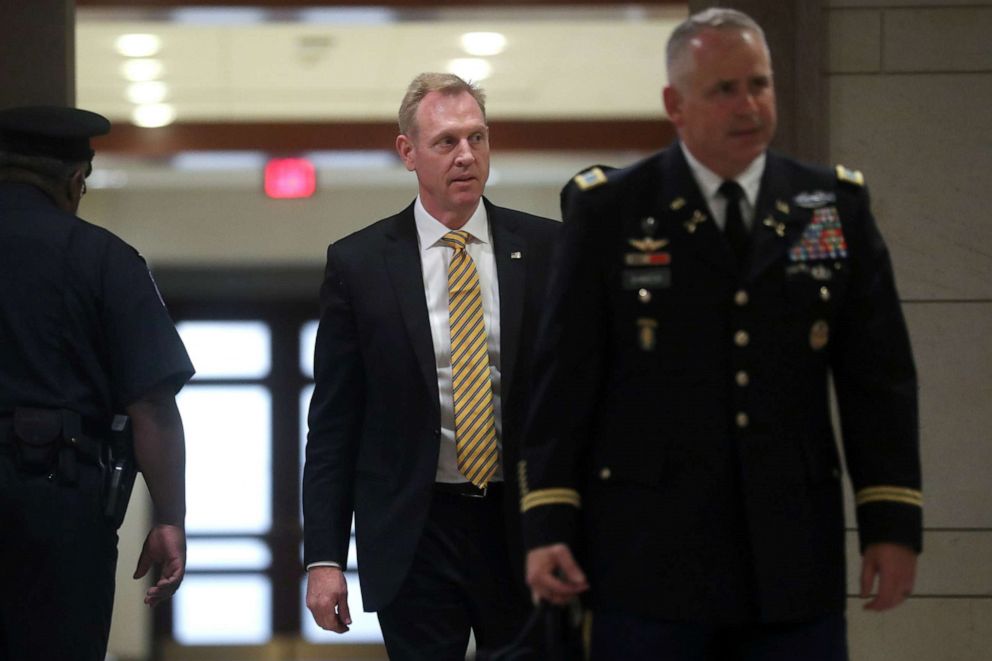Lawmakers criticize senior Trump officials after Iran intelligence briefing
Dems left the briefings with concerns about the administration's actions.
After hearing from top Trump officials, Democratic lawmakers are expressing alarm over the administration's posture in the Middle East and the possibility of a conflict with Iran.
In particular, some members of Congress even accused the Trump administration of "misrepresenting" U.S. intelligence about an Iranian threat and escalating tensions without a plan to prevent a larger conflict.
Secretary of State Mike Pompeo, acting Defense Secretary Patrick Shanahan and chairman of the Joint Chiefs of Staff Gen. Joseph Dunford briefed the House and Senate Tuesday on President Donald Trump's Iran strategy, recent intelligence of an increased Iranian threat and the U.S. reaction to it, including the deployment of an aircraft carrier strike group and B-52 bombers and the ordered departure of non-emergency personnel from Iraq.

"This is about deterrence, not about war. We're not about going to war. This is about continuing to protect our interests in the Middle East," Shanahan told reporters after both briefings.
Pompeo added that the administration has "plenty of ways" to communicate with Iran to de-escalate the situation.
But Democrats in both chambers left the briefings Tuesday with concerns about the administration's actions.
"I truly believe that the intel has been misinterpreted and misrepresented by Secretary Pompeo, by [national security adviser John] Bolton and other people that do want us to go to war in Iran, as a repeat to Iraq," said Rep. Ruben Gallego, D-Ariz., who served as a Marine in Iraq.

Most members said the greater fear was of conflict by accident -- that tensions would escalate and the two sides would be pushed into fighting.
"I worry very much, that intentionally or unintentionally, we can create a situation in which a war will take place," said Sen. Bernie Sanders, I-Vt. "When you do that, you're talking about a war that will go on and on and on."
Republicans, however, defended the administration's actions, saying they had helped to deter attacks on American personnel and interests and push back on Iran in ways that previous administrations hadn't.
"We're ready to respond if we have to. The best thing to happen is for everybody to calm down and Iran to back off and I'm hoping that this show of force will result in de-escalating, not escalating," said Sen. Lindsey Graham, R-S.C.
"This is purely defensive and deterrence in nature," said Rep. Michael McCaul, R-Texas, the top Republican on the House Foreign Affairs Committee.

But Sen. Chris Murphy, D-Conn., argued the administration's actions were "blind escalation" without a "thoughtful inter-departmental strategy for how this is ultimately going to wind up in a better deal" between the U.S. and Iran. "It doesn't seem like well thought out policies," he added.
The chairman of the House Armed Services Committee, Rep. Adam Smith, D-Calif., also expressed concern about how long it took senior officials to brief Congress. The White House first announced it was speeding up the deployment of the USS Abraham Lincoln aircraft carrier strike group on May 5 because of "a number of troubling and escalatory indications and warnings" from Iran.
"When you're trying to put together a policy like this, the co-equal branch of government that is the United States Congress should be far enough up on your list that it doesn't take you a week before you get to us, so it is not an acceptable answer for the Secretary of State to say to Congress, 'Sorry we didn't brief you earlier, but we were busy.' That doesn't fly," Smith said, adding that he was not satisfied with the briefing.
It was a sentiment shared across the Capitol by Senate Democrats. Senate Minority Leader Chuck Schumer, D-N.Y., said he told the three senior officials that they had to do a better job consulting Congress and the American people.
Shanahan pledged afterwards to be "more communicative with the American public."
ABC News's Sarah Kolinovsky and Mariam Khan contributed to this report from Capitol Hill




